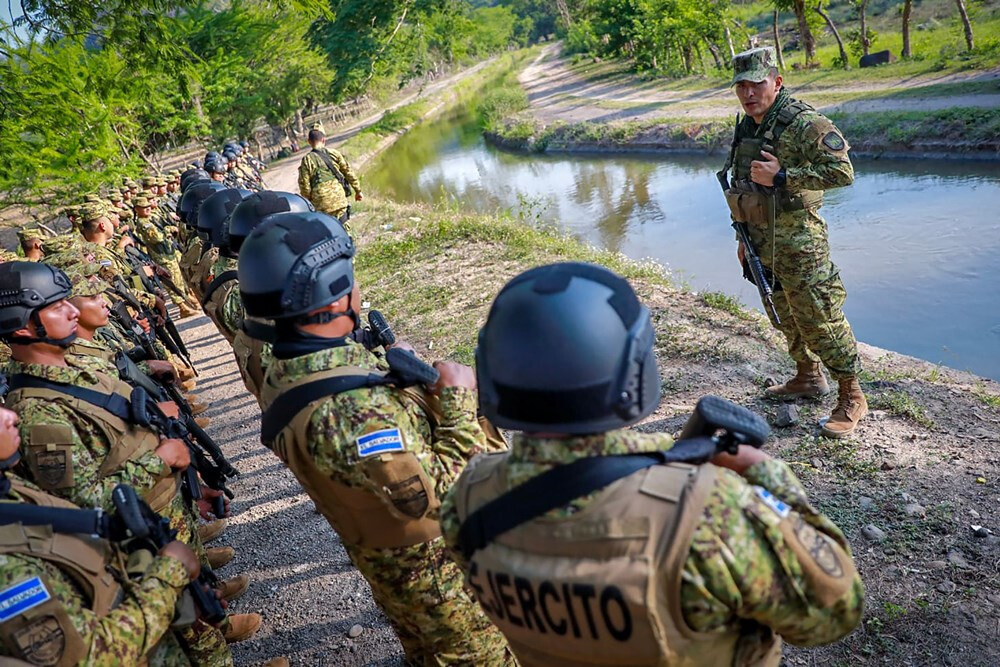
The Salvadoran government has expressed its strong will to respond to the murder of a police officer and, after a large-scale search operation, has arrested three suspects. President Nayib Bukele reiterated his strong stance against gangs, stating, "Those who took the life of our hero will pay the price."
According to local Salvadoran media reports on the 27th (local time), the Salvadoran military and police arrested three members of the notorious gang 'MS-13' (Mara Salvatrucha) suspected of attacking and killing one police officer who was on patrol on the 16th in the Nueva Concepción area, about 70 km north of the capital, San Salvador. The arrested suspects are reportedly immediately detained in a terrorism detention center.
This incident is the first murder of a police officer in El Salvador this year since the state of emergency was declared on March 27 last year. It is the fourth case of a police officer's death during the entire state of emergency period. Immediately after the incident, President Bukele expressed his outrage on his social media account, saying, "Those who took the life of our hero will surely pay the price."
The arrest operation involved a large-scale deployment of over 5,500 military and police personnel, who thoroughly searched the small city of Nueva Concepción, with a population of about 30,000. This is a clear example of how strongly the Salvadoran government is responding to gang crime.
For decades, El Salvador has suffered from serious social problems due to the violence and crime of notorious gangs such as 'MS-13' and 'Barrio 18'. These gangs have engaged in various crimes such as murder, robbery, and drug trafficking, undermining social order and threatening the safety of citizens.
Since taking office, President Nayib Bukele has made the eradication of gangs a top priority and has been pushing forward with a strong 'war on gangs'. As part of this effort, a state of emergency was declared on March 27, 2022, and strong measures restricting some constitutional rights have been implemented. Under the state of emergency, warrantless arrests and wiretapping are permitted, and military and police operations to crack down on gangs have been significantly strengthened.
Thanks to these strong measures, the Salvadoran government claims to have achieved significant results. Through the arrest of a large number of gang members, street crime rates have reportedly decreased significantly, and the country is shedding its former reputation as 'the most dangerous country in the world'. According to government announcements, tens of thousands of gang members have been arrested since the state of emergency, and the homicide rate has also significantly decreased.
However, President Bukele's 'war on gangs' has sparked serious controversy and criticism both domestically and internationally. Human rights organizations point out that under the state of emergency, innocent citizens are arbitrarily arrested and detained, and cases of human rights violations such as torture and abuse are frequent. Concerns are also being raised about the undermining of democratic values, such as the fairness of judicial procedures and restrictions on the activities of the press and civil society.
In particular, the poor conditions and inhumane treatment in the mega-prison built to accommodate a large number of gang members have been the subject of international criticism. This facility, which densely houses tens of thousands of inmates, lacks basic sanitation and medical facilities, threatening the health and lives of the prisoners.
The swift and large-scale response to the murder of the police officer can be interpreted as a reaffirmation of President Bukele's determination to eradicate gangs. However, at the same time, concerns that this strong response may further intensify human rights controversies and, in the long term, undermine the democratic values of Salvadoran society cannot be overlooked.
The Salvadoran government is expected to continue to push forward with its 'war on gangs'. President Bukele's high approval ratings and strong leadership are bolstering the 추진 of these policies. However, despite international criticism and concerns from domestic human rights organizations, it remains uncertain whether the government will make genuine efforts to protect human rights and establish the rule of law.
The murder of this police officer and the government's response to it indicate that El Salvador's 'war on gangs' is at a critical crossroads. How the country harmoniously resolves the task of achieving the goal of eradicating gang crime while upholding human rights and democratic values will be a crucial factor determining El Salvador's future.
[Copyright (c) Global Economic Times. All Rights Reserved.]






























